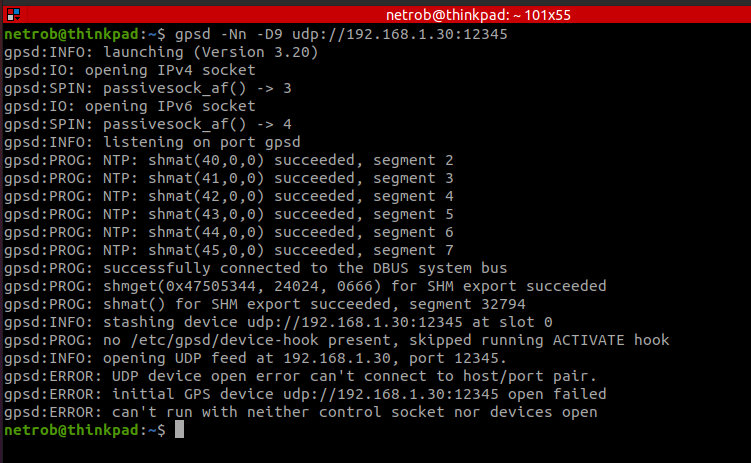Dear Gary,
My setup includes one smartphone from which I send the GPS coordinates using GPSD clients and one PC where I run the GPSD daemon as shown in below picture.
It works fine when I use * instead of the phone IP address (192.168.1.30) i.e., gpsd -Nn udp://*:12345 just works great and catch all the incoming GPS data.
I wanted to ask why the below command fails everytime when I added the phone IP address? I confirm that the phone and my PC are in the same subnet and are reachable to each other. Please suggest. Thank you.
gpsd -Nn -D9 udp://192.168.1.30:12345

Best Regards,
Debashisha Mishra
----- On Apr 20, 2023, at 10:36 PM, Gary E. Miller <gem@rellim.com> wrote:
Yo Debashisha!
On Thu, 20 Apr 2023 10:10:57 +0200 (CEST)
Debashisha Mishra <debashisha.mishra@univ-lorraine.fr> wrote:
> Thank you. I appreciate it a lot. I attempted what you advised. To
> transmit GPS data to the host computer, I utilized two mobile devices
> running the GPSD Forwarder program. The first phone's GPS forwarding
> port number was 12345, while for the second phone's was 12346. Using
> gpspipe and the following instructions, I was able to collect GPS
> data from many ports on the host machine and organize it in a way
> that made sense.
>
> gpsd -Nn udp://*:12345 udp://*:12346
>
> and then using gpspipe command as follows to filter out NMEA
> sentences from two different phones.
>
> gpspipe -r localhost:2947:udp://*:12345
> gpspipe -r localhost:2947:udp://*:12346
Good news that you got it working!
> I wanted to bring another fact which I noticed in the data which I
> collected. I used a sample c++ program (attached to this email and
> also available on Internet) to understand the latitude and longitude
> which I receive from these two different device. I put the two
> devices close to each other (~1 meter apart).
A common test. More interesting when you use PPP or RTK.
> I believe the GPSD in
> the host computer is presenting the GPS fix information (latitude and
> longitude) by intelligently multiplexing them even if one of the
> phone does not report any GPS data intermittently .
Nope. gpsd is GIGO: Garbage In/Garbage Out. The most it will do
is compute some missing values. Like computing ECEF from Lat/Lon?alt
when the receiver does not report ECEF.
Why not just run one cpgs for each feed? Like you did with the gpspipe?
> The screenshot
> "gpsd-two-phones.png" is attached to the email to show this. Each row
> shows the <time stamp, latitude, longitude and the device path>. The
> data were very identical from two devices. I would NOT expect them to
> be exactly identical to 8 decimal digits for both latitude and
> longitude.
Depends on the device. Many receivers do not report Lat/Lon to better
than several meters precision.
> Am I missing something here while capturing them in the c++ program?
Yes, you are missing things. You make the same mistakes we often soo.
I suggest you read the gpsd examples:
https://gpsd.io/gpsd-client-example-code.html
And certainly do not block:
// Do nothing until fix, block execution for 1 second (busy wait mitigation)
Just have gpsd tell you when new data is available,
RGDS
GARY
---------------------------------------------------------------------------
Gary E. Miller Rellim 109 NW Wilmington Ave., Suite E, Bend, OR 97703
gem@rellim.com Tel:+1 541 382 8588
Veritas liberabit vos. -- Quid est veritas?
"If you can't measure it, you can't improve it." - Lord Kelvin